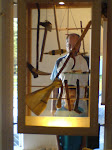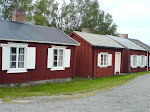lördag 7 juli 2007
More about needs/mer om behov…
Bosch writes about making a distinction between what you need as an adult and what you needed but didn’t get as a child.
At page 90:
“In situations that do arouse alarm signals the amygdale responds even before the neo-cortex can realize what is happening [we can control things and events we are confronted with that doesn’t arouse intense emotional reactions, but not the ones that arouse alarm signals, we just react on triggers, maybe more about this in a blogpost about the brain!!? But it isn’t sure we are aware of that this happens or that we react on a trigger or symbol at all]. Mere cognitive understanding of what is happening in those situations is very important, and it is the first step towards healing, but it cannot produce lasting changes in the way we feel and react to situations [for this we need to know what’s underneath in some way and to a certain degree] /…/
Just as we feel childhood feelings as if they are about now, we experience the need for something as if it is a present-day need. ‘I need this and I need it now or somewhere soon in the future.’ Whenever we experience a feeling of urgency we are usually dealing with an old unmet need from childhood. Needs we have as children are urgent, we can’t wait for our sleep, or food, or safety or warmth, etc. The child has no concept of time, no capacity to minimize the need, no possibility to take care of herself. The adults we are now are able to wait. We can understand time, we can take care of ourselves. Of course we need food, clothing, transportation and shelter [as adults], but we can survive without much else. It might not be pleasant, but it would be possible. For the child we were it wasn’t possible to survive when our needs are not met. This explains the urgency of childhood needs. Whenever we feel we need something urgently or we feel we need to do something urgently, we are probably dealing with a childhood need.”
Thought again about blaming oneself (is the other side of the coin to blame others? Or can it be?)… “My character! (bad, stupid me!!!)”
I know of a man who also did this, very harshly, when he dropped the spoon or knife, because of a tumour in the left front of the brain (???), so his fine-motor functions was damaged, but he was still very strong and could squeeze ones hand very hard:
“I’ll kill myself!!!” he said, for only dropping a spoon or knife!!
Was he blamed when he dropped things or did mistakes, and forbidden to do a lot else? Blamed when he did mistakes, which a child does and which are natural for a child?? Extreme perfectionist-demands, among a lot of other demands? (Bosch also writes that people in therapy can have ideas from where their reactions stem, but discover that the reality was about something quite else, she thinks this is important to be aware of, because if you look for certain things it can block the real truth. Jenson writes about this too: if one unconsciously tries to rewrite ones story/history the failure is unavoidable, page 165 in the Swedish, not revised, edition).
But this to blame oneself is actually a defence according to Bosch, is to avoid realizing the truth, a defence the child first resorted to to survive. It’s easier after all to blame oneself as a child than blaming important grown ups, grown ups the child had to confide in and believe in and depended on (by the way Freyd also writes about the societal denial and what this causes… But when you aren’t allowed to question or see what you gave endured as wrong, then things are passed further, and goes on and on! She too means, and on top this also put us at distance of each others, it creates walls behind us, more or less thick. See previous blogpost about needs).
But the ones that are more prone to blaming themselves (at least admits to it more openly) are also more prone to seeking help. If one is more prone to blaming others and pushes things away, one is less prone seeking help. And this can be true both for women and men. But women in general seek help more than men. But, I know of men seeking help AND of women that push things away, but want and need to dominate and have power etc., need to sit on weaker people even? And are less interested in development, neither personally nor in their works…
Needs – what do we in fact need today as grown ups? And what do we not need? Yes, what and which do we try to fill? And how? What consequences does this give, if not to others so at least to ourselves??
And the strange thing: the ones that are protected and seem to be complete are the parents? But the small children need to be corrected and changed and are seen as being filled with evilness. How come? IF it really WAS about genes!!?? Hasn’t ones children then inherited at least some of these fantastic, great genes from their grandparents? On whom are one, have one been, putting the highest demands on? See what Sandra and Anika talked with the father respectively the mother about in Millers “Paths of Life”, was it Anika who said something about this to her mother, which sadly was more in denial than Sandra’s father??
PS. Yes, I am really writing rapidly, with all what that means!! When I reread I see things here and there… I change some of the worst misses…
-//-
Jag översätter bara Boschcitaten ovan, sidan 90 i hennes bok:
”I situationer som verkligen väcker alarmsignaler svarar amygdala innan neocortex inser vad som händer [vi kan kontrollera saker och händelser vi konfronteras med som inte väcker intensiva känslomässiga reaktioner, men inte de som väcker alarmsignaler, vi reagerar bara på triggers, kanske mer om detta i kommande blogginlägg. Men vi kanske inte märker denna reaktion medvetet]. Ren kognitiv förståelse av vad som händer i dessa situationer är väldigt viktig och det är fösta steget mot helande, men det kan inte producera bestående ändringar i sättet vi känner och reagerar på situationer [för detta behöver vi veta vad som finns under det hela på något sätt och till en viss, tillräcklig grad] /…/
Precis som vi känner barndomskänslor som om de var om nuet, så upplever vi behovet av någonting som om det var ett behov idag. ’Jag behöver detta och jag behöver det nu eller någonstans i nära framtid.’ Närhelst vi känner en känsla av nödtvång har vi vanligtvis att göra med ett gammalt omött behov från barndomen. Behov vi har som barn är brådskande, vi kan inte vänta för vår sömn, eller mat, eller säkerhet och värme osv. Barnet har inget tidskoncept, ingen kapacitet att förminska behovet, ingen möjlighet att ta hand om sig själv. Naturligtvis behöver vi mat, kläder, transport och skydd [som vuxna], men vi kan överleva en massa annat. Det kanske inte är trevligt/njutbart, men det vore möjligt. För barnet vi var var det inte möjligt att överleva när våra behov inte möttes. Detta förklarar nödtvånget hos barndomsbehov. Närhelst vi känner att vi behöver någonting brådskande eller vi känner att vi behöver göra någonting brådskande/av nödtvång, har vi troligen att göra med ett barndomsbehov.”
At page 90:
“In situations that do arouse alarm signals the amygdale responds even before the neo-cortex can realize what is happening [we can control things and events we are confronted with that doesn’t arouse intense emotional reactions, but not the ones that arouse alarm signals, we just react on triggers, maybe more about this in a blogpost about the brain!!? But it isn’t sure we are aware of that this happens or that we react on a trigger or symbol at all]. Mere cognitive understanding of what is happening in those situations is very important, and it is the first step towards healing, but it cannot produce lasting changes in the way we feel and react to situations [for this we need to know what’s underneath in some way and to a certain degree] /…/
Just as we feel childhood feelings as if they are about now, we experience the need for something as if it is a present-day need. ‘I need this and I need it now or somewhere soon in the future.’ Whenever we experience a feeling of urgency we are usually dealing with an old unmet need from childhood. Needs we have as children are urgent, we can’t wait for our sleep, or food, or safety or warmth, etc. The child has no concept of time, no capacity to minimize the need, no possibility to take care of herself. The adults we are now are able to wait. We can understand time, we can take care of ourselves. Of course we need food, clothing, transportation and shelter [as adults], but we can survive without much else. It might not be pleasant, but it would be possible. For the child we were it wasn’t possible to survive when our needs are not met. This explains the urgency of childhood needs. Whenever we feel we need something urgently or we feel we need to do something urgently, we are probably dealing with a childhood need.”
Thought again about blaming oneself (is the other side of the coin to blame others? Or can it be?)… “My character! (bad, stupid me!!!)”
I know of a man who also did this, very harshly, when he dropped the spoon or knife, because of a tumour in the left front of the brain (???), so his fine-motor functions was damaged, but he was still very strong and could squeeze ones hand very hard:
“I’ll kill myself!!!” he said, for only dropping a spoon or knife!!
Was he blamed when he dropped things or did mistakes, and forbidden to do a lot else? Blamed when he did mistakes, which a child does and which are natural for a child?? Extreme perfectionist-demands, among a lot of other demands? (Bosch also writes that people in therapy can have ideas from where their reactions stem, but discover that the reality was about something quite else, she thinks this is important to be aware of, because if you look for certain things it can block the real truth. Jenson writes about this too: if one unconsciously tries to rewrite ones story/history the failure is unavoidable, page 165 in the Swedish, not revised, edition).
But this to blame oneself is actually a defence according to Bosch, is to avoid realizing the truth, a defence the child first resorted to to survive. It’s easier after all to blame oneself as a child than blaming important grown ups, grown ups the child had to confide in and believe in and depended on (by the way Freyd also writes about the societal denial and what this causes… But when you aren’t allowed to question or see what you gave endured as wrong, then things are passed further, and goes on and on! She too means, and on top this also put us at distance of each others, it creates walls behind us, more or less thick. See previous blogpost about needs).
But the ones that are more prone to blaming themselves (at least admits to it more openly) are also more prone to seeking help. If one is more prone to blaming others and pushes things away, one is less prone seeking help. And this can be true both for women and men. But women in general seek help more than men. But, I know of men seeking help AND of women that push things away, but want and need to dominate and have power etc., need to sit on weaker people even? And are less interested in development, neither personally nor in their works…
Needs – what do we in fact need today as grown ups? And what do we not need? Yes, what and which do we try to fill? And how? What consequences does this give, if not to others so at least to ourselves??
And the strange thing: the ones that are protected and seem to be complete are the parents? But the small children need to be corrected and changed and are seen as being filled with evilness. How come? IF it really WAS about genes!!?? Hasn’t ones children then inherited at least some of these fantastic, great genes from their grandparents? On whom are one, have one been, putting the highest demands on? See what Sandra and Anika talked with the father respectively the mother about in Millers “Paths of Life”, was it Anika who said something about this to her mother, which sadly was more in denial than Sandra’s father??
PS. Yes, I am really writing rapidly, with all what that means!! When I reread I see things here and there… I change some of the worst misses…
-//-
Jag översätter bara Boschcitaten ovan, sidan 90 i hennes bok:
”I situationer som verkligen väcker alarmsignaler svarar amygdala innan neocortex inser vad som händer [vi kan kontrollera saker och händelser vi konfronteras med som inte väcker intensiva känslomässiga reaktioner, men inte de som väcker alarmsignaler, vi reagerar bara på triggers, kanske mer om detta i kommande blogginlägg. Men vi kanske inte märker denna reaktion medvetet]. Ren kognitiv förståelse av vad som händer i dessa situationer är väldigt viktig och det är fösta steget mot helande, men det kan inte producera bestående ändringar i sättet vi känner och reagerar på situationer [för detta behöver vi veta vad som finns under det hela på något sätt och till en viss, tillräcklig grad] /…/
Precis som vi känner barndomskänslor som om de var om nuet, så upplever vi behovet av någonting som om det var ett behov idag. ’Jag behöver detta och jag behöver det nu eller någonstans i nära framtid.’ Närhelst vi känner en känsla av nödtvång har vi vanligtvis att göra med ett gammalt omött behov från barndomen. Behov vi har som barn är brådskande, vi kan inte vänta för vår sömn, eller mat, eller säkerhet och värme osv. Barnet har inget tidskoncept, ingen kapacitet att förminska behovet, ingen möjlighet att ta hand om sig själv. Naturligtvis behöver vi mat, kläder, transport och skydd [som vuxna], men vi kan överleva en massa annat. Det kanske inte är trevligt/njutbart, men det vore möjligt. För barnet vi var var det inte möjligt att överleva när våra behov inte möttes. Detta förklarar nödtvånget hos barndomsbehov. Närhelst vi känner att vi behöver någonting brådskande eller vi känner att vi behöver göra någonting brådskande/av nödtvång, har vi troligen att göra med ett barndomsbehov.”
Prenumerera på:
Kommentarer till inlägget (Atom)





























Inga kommentarer:
Skicka en kommentar